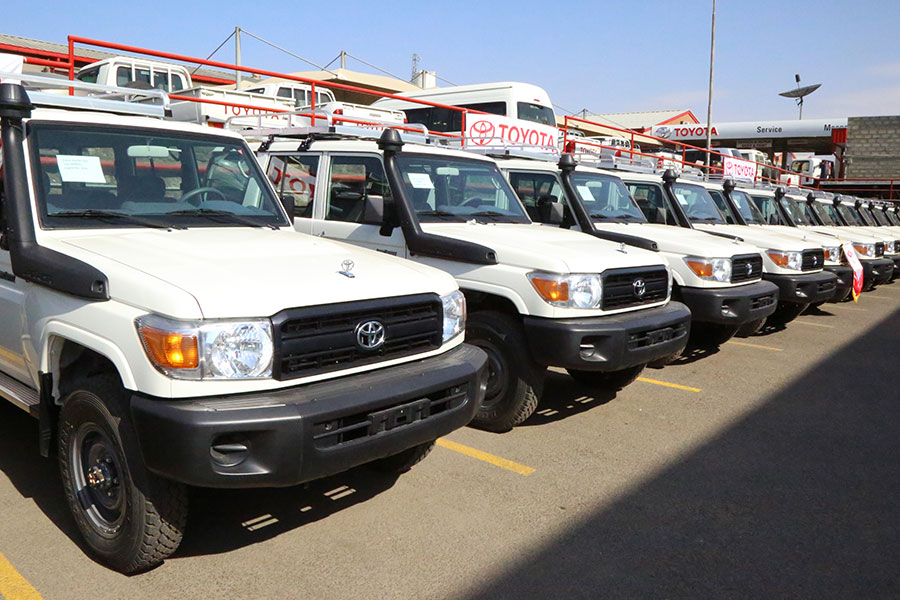
Fortune News | Feb 09,2019
Aug 19 , 2023
By Yasmin Nesre ( FORTUNE STAFF WRITER )
Wound-up cross-border operators are frustrated as short-term border permits have them subjected to interrupted schedules and frequent queues at the Ministry of Transport & Logistics offices.
The long queue around the offices of the Ministry located on Ras Lulseged Street had managers, drivers and owners line up waiting to obtain their crossing permits to Djibouti that expire every two months.
As the Ministry hastens its implementation of a pair of directives requiring the transition of freight and transport associations into commercial entities, drivers and operators are caught against lacklustre implementation.
The drivers say bringing down the duration of the permit from 12 a year to a couple of months has forced them to come to Addis Abeba mid-journey.
Last week, the lorry truck driver Beleyu Anteneh was anxiously waiting for his turn opting to eat breakfast at the Ministry's offices and be the first customer that gets service with hopes of saving time.
The frustrated driver parked his car in Mojo town 64Km from the capital after realizing that his Djibouti permit had only a week left before expiring.
Unsure of whether or not he will face difficulties on the road, Beleyu hitched a ride back and came to renew his permit. He said two-month permits do not take time spent at garages and unforeseen obstacles on the road into account.
He is frustrated over the slow process while waiting for two days after paying 100 Br for renewal.
"I'm losing money by the day," he told Fortune, hoping to be back on the road by the afternoon.
With 95pc of freight in and out of Ethiopia being channelled through Djibouti, the smooth facilitation of logistics in the corridor has a wide-reaching impact on the price and availability of goods in the country.
Yirga Tadesse, head of the logistics directory at the Ministry, ascribes the blame back to the freight operators themselves as they have failed to fully establish themselves as commercial entities.
He claims that the Ministry is awaiting full commercialisation of all transport associations in order to start issuing one-year Djibouti permits through a digitised process. Yirga cautioned that the two-month permit will be removed soon if the associations failed to reestablish themselves as commercial entities.
"We are issuing them only so that the flow of goods won't stop," he told Fortune. "But it won't be for long."
Despite the Ministry's insistence on swift transformation, the path to becoming a commercial entity has not been smooth sailing for the companies that managed to realise it with stipulations on the nature of vehicles, the amount of capital, and the education level of owners serving as challenges faced by associations trying to make the transition.
Dejene Luche, the secretariat of the 50-member-strong Ethiopian Transporters Federation, said about 80pc of the associations have already become commercial entities, with the remaining few being held back by a capital shortage.
He cited the cessation of bank loans for vehicle purchases as a critical challenge, along with specific education requirements needed by management for the change. He posited issuing a Djibouti visa as an alternative option besides crossing permits.
"We are urging authorities for longer duration permits," Dejene told Fortune.
Associations that have successfully changed to commercial entities express the pangs of tiresome bureaucracies and tedious constant queues.
Yosef Alemu, general manager of Freedom Transport & Logistics S.C, a 70-member strong company established with four million Birr paid-up capital.
He has found the transformation into a commercial entity to be fraught with several issues merely piled on by the protracted border permit issuing process. The manager said that drivers are held up at border crossings due to permits expiring on their return journey.
He emphasised awareness creation is also lacking from the Ministry's side while reasoning that the requirement to register vehicles not owned by members through the Document Authentication & Registration Agency for a year has strained their finances by subjecting them to additional taxation.
"The implementation process is rushed," said Yoseph.
Logistics experts underscore the importance of ensuring the freight vehicles continue operating as they are a major lifeline to the industry.
Mengistu Hailemariam (PhD) was a former director at the Ethiopian Maritime Affairs Authority who serves as a strategic advisor. According to him, prolonged durations on ports translate to higher costs and inflated prices of goods.
He urges authorities to make the documentation process easier as it is a time-sensitive problem.
"The process should be seamless," he told Fortune. "We can't afford to lag behind."
PUBLISHED ON
Aug 19,2023 [ VOL
24 , NO
1216]

Fortune News | Feb 09,2019

Radar | Feb 06,2021


Fortune News | Aug 07,2021

Fortune News | Jun 04,2022

Editorial | Aug 25,2024

Fortune News | Aug 24,2019

Commentaries | Feb 27,2021

Fortune News | Mar 26,2022

Fortune News | Jan 07,2022

Dec 22 , 2024 . By TIZITA SHEWAFERAW
Charged with transforming colossal state-owned enterprises into modern and competitiv...

Aug 18 , 2024 . By AKSAH ITALO
Although predictable Yonas Zerihun's job in the ride-hailing service is not immune to...

Jul 28 , 2024 . By TIZITA SHEWAFERAW
Unhabitual, perhaps too many, Samuel Gebreyohannes, 38, used to occasionally enjoy a couple of beers at breakfast. However, he recently swit...

Jul 13 , 2024 . By AKSAH ITALO
Investors who rely on tractors, trucks, and field vehicles for commuting, transporting commodities, and f...

Sep 6 , 2025
The dawn of a new year is more than a simple turning of the calendar. It is a moment...

Aug 30 , 2025
For Germans, Otto von Bismarck is first remembered as the architect of a unified nati...

Aug 23 , 2025
Banks have a new obsession. After decades chasing deposits and, more recently, digita...

Aug 16 , 2025
A decade ago, a case in the United States (US) jolted Wall Street. An ambulance opera...